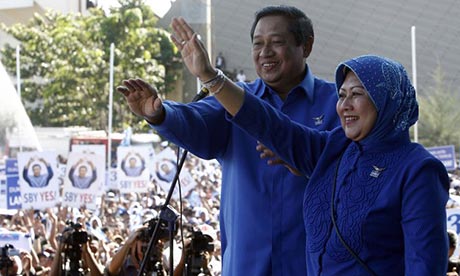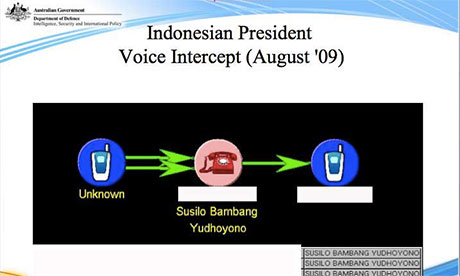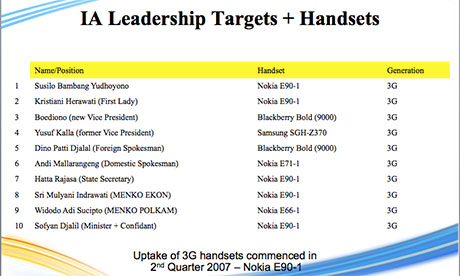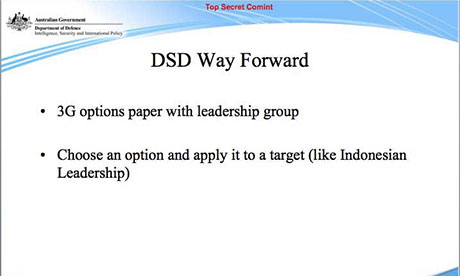 |
| Mr and Mrs President Indonesia |
The document, dated November 2009, names the president and nine of his inner circle as targets of the surveillance, including the vice-president, Boediono, who last week visited Australia. Other named targets include ministers from the time who are now possible candidates in next year's Indonesian presidential election, and the first lady, Kristiani Herawati, better known as Ani Yudhoyono.
When a separate document from Snowden, a former contractor to the US's National Security Agency (NSA), showed Australia had spied on Indonesia and other countries from its embassies, the Indonesian foreign minister, Marty Natalegawa, reacted angrily and threatened to review co-operation on issues crucial to Australia such as people smuggling and terrorism.
The revelation strained a bilateral relationship already under pressure over the Abbott government's policy to “turn back” boats of asylum seekers coming to Australia. The new leak, published jointly by Guardian Australia and the Australian Broadcasting Corporation, reveals the specific top-level targets and is likely to seriously escalate those tensions.
The leaked material is a slide presentation, marked top secret, from the Australian Department of Defence and the Defence Signals Directorate, or DSD, (now called the Australian Signals Directorate), dealing with the interception of mobile phones as 3G technology was introduced in Asia. It includes a slide titled Indonesian President Voice Intercept, dated August 2009 and another slide, titled IA Leadership Targets + Handsets, listing the president and the first lady as having Nokia E90-1s, Boediono as having a BlackBerry Bold 9000, as well as the type and make of the mobile phones held by the other targets.
Also named as targets for the surveillance are Dino Patti Djalal, at the time the president's foreign affairs spokesman, who recently resigned as Indonesia's ambassador to the US and is seeking the candidacy in next year's presidential election for the president's embattled Democratic party, and Hatta Rajasa, now minister for economic affairs and possible presidential candidate for the National Mandate party. Hatta was at the time minister for transport and his daughter is married to the president's youngest son.
A slide entitled Indonesian President Voice Intercept (August '09), shows a call from an unknown number in Thailand to Yudhoyono. But the call did not last long enough for the DSD to fulfil its aims. “Nil further info at this time (didn’t make the dev threshold – only a sub-1minute call),” a note at the bottom says.
Another slide, titled Indonesian President Voice Events, has a graphic of calls on Yudhoyono's Nokia handset over 15 days in August 2009. It plots CDRs – call data records – which record the numbers called and calling a phone, the duration of calls, and whether it was a voice call or SMS. The agency, in what is standard procedure for surveillance, appears to have expanded its operations to include the calls of those who had been in touch with the president. Another slide, entitled Way Forward, states an imperative: “Must have content.”
Also on the list of “IA Leadership Targets” are:
• Jusuf Kalla, the former vice-president who ran as the Golkar party presidential candidate in 2009.
• Sri Mulyani Indrawati, then a powerful and reforming finance minister and since 2010 one of the managing directors of the World Bank Group.
• Andi Mallarangeng, a former commentator and television host who was at the time the president's spokesman, and who was later minister for youth and sports before resigning amid corruption allegations.
• Sofyan Djalil, described on the slide as a “confidant”, who until October 2009 was minister for state-owned enterprises.
• Widodo Adi Sucipto, a former head of the Indonesian military who was until October 2009 security minister.
Asked about the previous revelations about the embassies, Tony Abbott emphasised that they occurred during the administration of the former Labor government, that Australia's activities were not so much “spying” as “research” and that its intention would always be to use any information “for good”. The prime minister has repeatedly insisted Australia's relationship with Indonesia is “good and getting better”.
Boediono said during his visit to Australia – before being revealed as an intended target of Australia's surveillance – that the Indonesian public was “concerned” about the spying allegations.
“I think we must look forward to come to some arrangement which guarantees that intelligence information from each side is not used against the other,” he said. “There must be a system.”
At the bottom of each slide in the 2009 presentation is the DSD slogan: “Reveal their secrets – protect our own.” The DSD is credited with supplying the information.
Yudhoyono now joins his German, Brazilian and Mexican counterparts as leaders who have been monitored by a member of Five Eyes, the collective name for the surveillance agencies of the US, Britain, Australia, New Zealand and Canada, who share information.
Germany, Brazil and Mexico have all protested to the US over the infringement of privacy by a country they regarded as friendly. The German chancellor, Angela Merkel, reacted with outrage to the revelation that her personal mobile phone had been tapped by the US, calling President Barack Obama to demand an explanation. The US eventually assured the chancellor that her phone was “not currently being tapped and will not be in the future”.
The Australian slide presentation, dated November 2009, deals with the interception of 3G mobile phones, saying the introduction of 3G in south-east Asia was nearly complete and providing dates for 3G rollout in Cambodia, Malaysia, the Philippines, Singapore and Thailand.
Talking about future plans, the Australian surveillance service says it “must have content” and be able to read encrypted messages, which would require acquiring the keys that would unlock them. Other documents from Snowden show the intelligence agencies have made huge inroads in recent years in finding ways into encrypted messages.
One of the slides, entitled DSD Way Forward, acknowledges that the spy agency’s resources are limited compared with its US and British counterparts. It says there is a “need to capitalise on UKUSA and industry capability”, apparently a reference to the help provided – willingly or under pressure – from telecom and internet companies. The slides canvass "options" for continued surveillance and the final slide advises: “Choose an option and apply it to a target (like Indonesian leadership).”
The tension between Australia and Indonesia began in October when documents revealed by the German newspaper Der Spiegel and published by Fairfax newspapers revealed that Australian diplomatic posts across Asia were being used to intercept phone calls and data. The Guardian then revealed that the DSD worked alongside America’s NSA to mount a massive surveillance operation in Indonesia during a UN climate change conference in Bali in 2007.
But these earlier stories did not directly involve the president or his entourage. Abbott made his first international trip as prime minister to Indonesia and has repeatedly emphasised the crucial importance of the bilateral relationship.
Speaking after his meeting with Boediono last week, Abbott said: "All countries, all governments gather information. That's hardly a surprise. It's hardly a shock.
"We use the information that we gather for good, including to build a stronger relationship with Indonesia and one of the things that I have offered to do today in my discussions with the Indonesian vice-president is to elevate our level of information-sharing because I want the people of Indonesia to know that everything, everything that we do is to help Indonesia as well as to help Australia. Indonesia is a country for which I have a great deal of respect and personal affection based on my own time in Indonesia."
Asked about the spying revelations in a separate interview, Abbott said: "To use the term spying, it's kind of loaded language … researching maybe. Talking to people. Understanding what's going on."
On Monday a spokesman for Abbott said: "Consistent with the long-standing practice of Australian governments, and in the interest of national security, we do not comment on intelligence matters."
It remains unclear exactly who will contest next year's Indonesian presidential election, in which Yudhoyono, having already served two terms, is not eligible to stand. Based on recent polling, the popular governor of Jakarta, Joko Widodo, known as Jokowi, and former general Prabowo Subianto would be frontrunners.



Tidak ada komentar:
Posting Komentar
Catatan: Hanya anggota dari blog ini yang dapat mengirim komentar.